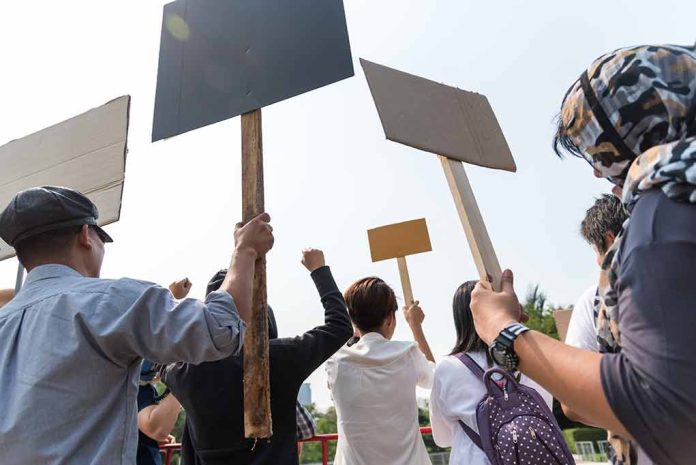
Protesters rally at Kellogg’s Michigan headquarters, demanding the removal of artificial dyes from U.S. cereals, despite the company’s previous pledge to phase them out.
At a Glance
- Hundreds gathered outside WK Kellogg Co.’s Michigan HQ to protest artificial dyes in U.S. cereals.
- Kellogg had pledged to remove synthetic dyes by 2018 but hasn’t fully implemented changes domestically.
- Protesters delivered petitions with over 400,000 signatures citing health concerns.
- Kellogg claims its products are safe and comply with federal regulations.
- California’s recent ban on certain food dyes in schools may influence Kellogg’s future decisions.
Protesters Demand Action on Artificial Dyes
In a display of consumer activism, hundreds of protesters gathered outside WK Kellogg Co.’s Michigan headquarters on Tuesday, calling for the removal of artificial dyes from the company’s breakfast cereals sold in the United States. The demonstration highlights growing concerns over the use of synthetic ingredients in popular food products, particularly those marketed to children.
The protest comes nearly a decade after Kellogg announced plans to remove artificial colors and ingredients from its cereals by 2018. While the company has implemented these changes in many international markets, U.S. consumers are still finding artificial dyes in their favorite breakfast staples.
Dozens of people rallied outside the Michigan headquarters of WK Kellogg Co. Tuesday, demanding that the company remove artificial dyes from its breakfast cereals in the U.S.
— CBS Detroit (@CBSDetroit) October 16, 2024
Health Concerns and Consumer Pressure
Activists at the rally delivered petitions with over 400,000 signatures, urging Kellogg to remove artificial dyes and the preservative BHT from its U.S. products. The protesters, including politicians, doctors, and nutritionists, cited potential health and behavioral concerns in children as their primary motivation.
“I’m here for all the mothers who struggle to feed their kids healthy food without added chemicals,” said Vani Hari, a food activist who previously pressured Kraft Heinz to remove artificial dyes from its macaroni and cheese.
The concerns raised by protesters are not without merit. Several countries, including the UK, Japan, and Canada, have banned or restricted the use of additives like Red 40, Yellow 5, Yellow 6, Blue 1, and BHT due to potential health risks. The European Union requires warning labels on products containing these dyes, stating they may adversely affect children’s activity and attention.
Kellogg’s Response and Market Differences
In response to the protest, Kellogg issued a statement defending its products: “Today, more than 85% of our cereal sales contain no colors from artificial sources. We continuously innovate new cereals that do not contain colors from artificial sources across our biggest brands, offering a broad choice of nourishing foods for our consumers.”
The company maintains that its cereals are safe and comply with federal regulations. However, the discrepancy between U.S. and international product formulations remains a point of contention. In countries like Canada, Kellogg uses natural colorings such as concentrated carrot, watermelon, and blueberry juices, while U.S. versions of the same cereals still contain artificial colors.
Potential for Change
The protest in Michigan may signal a turning point for Kellogg and the broader food industry. California’s recent passage of a law banning certain food dyes in public schools could have far-reaching implications, potentially influencing Kellogg’s future decisions regarding product formulations.
As consumer awareness and demand for natural ingredients continue to grow, food manufacturers may find themselves under increasing pressure to reformulate their products. The outcome of this protest and Kellogg’s response could set a precedent for how major food companies address similar concerns in the future.
Sources:
- Protesters demand Kellogg remove artificial colors from Froot Loops and other cereals
- Protesters demand Kellogg’s remove ‘harmful additives’ injected into Froot Loops, Apple Jacks in US: ‘Here for all the mothers’
- Protesters demand Kellogg remove artificial colors from Froot Loops and other cereals
- Kellogg’s faces protests over food dyes in popular breakfast cereals
- State representative, doctors, and nutritionists protest Kellogg’s in Battle Creek






















